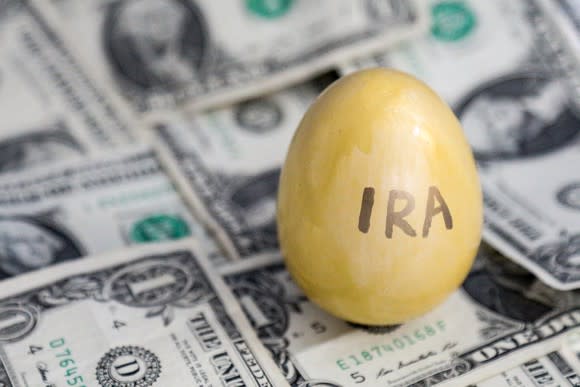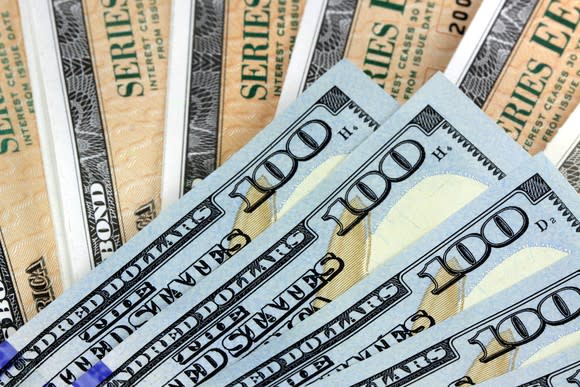5 Easy Ways to Make Money in 2019
Last year was a wake-up call to investors that the stock market doesn't actually go up in a straight line. Wall Street and investors faced two stock market corrections in 2018, with the current one being the steepest we've witnessed in almost a decade. It has a lot of folks questioning how best to make money in 2019 and beyond.
What I'm here to tell you is that making money isn't as hard as you might think, as long as you're patient and are targeting high-success opportunities. Here are five easy ways you can make money in 2019.

Image source: Getty Images.
1. Buy dividend stocks
One thing you'll notice about this list is that it's weighted toward the idea of investing into the stock market over a long period of time. Sure, stocks had their worst year in about a decade in 2018, but historically the market has returned 7% annually, inclusive of dividend reinvestment and when adjusted for inflation. That type of return has been tough to beat, which is what makes buying stocks so attractive during corrections.
In particular, investors are encouraged to take a closer look at dividend stocks in 2019. Dividend-paying companies offer a number of advantages, aside from the fact that they've historically outperformed their non-dividend-paying peers. Dividend stocks usually have time-tested business models, can help hedge against the inevitable downside in the stock market, and almost always allow for a reinvestment plan to be set up. A dividend reinvestment plan (DRIP) is the same strategy top money managers use to compound the growth of their clients' wealth.
Want a solid income stock to consider? Try AT&T (NYSE: T), which is a company I recently added to my portfolio for the first time. AT&T isn't going to knock investors' socks off with its growth rate, but this boring company is rolling in operating cash flow and substantial wireless-market share in the United States. It should benefit in the coming years from a tech-upgrade revolution caused by its 5G network rollout. Additionally, the company's acquisition of Time Warner and its prized CNN, TBS, and TNT networks provides a dangling carrot to attract new video customers. I assure you, AT&T's 7.3% dividend yield is for real and very sustainable.

Image source: Getty Images.
2. Open/contribute to an IRA
One of the smartest things you can do with your money is to open or contribute more to an IRA. This has been the case for a long time, but it's going to get even more attractive in 2019. That's because the amount you're able to contribute is increasing.
In 2018, the contribution limit was set at $5,500 for those 49 and younger, and up to $6,500 for folks 50 and over. This year, the IRA contribution limit rises to $6,000, with an extra $1,000 ($7,000 total) for people 50 and over who qualify for the catch-up provision. IRA accounts encourage Americans to save and not touch their nest egg until retirement. Since the market returns an average of 7% per year, it's the perfect tool to ignore the short-term white noise and allow your investments to work for you over the long haul.
One note of caution: Not everyone is allowed to invest in all types or IRAs. A Roth IRA, which provides no up-front tax benefit but allows an account holder to withdraw during retirement without paying a single cent in capital gains tax, bases contribution limits on your tax filing status. Earnings over a certain amount could impact your ability to contribute.

Image source: Getty Images.
3. Buy a corporate bond
Though it's anything but exciting, thinking about corporate bonds isn't so bad with the stock market correcting and the Federal Reserve in a multiyear tightening cycle.
The obvious advantage of buying into bonds is the general safety of what you're purchasing, as well as reduced volatility. As long as you buy investment-grade bonds, your chance of losing money tends to be pretty slim.
On the other hand, the downside of bonds is that your annual return is probably going to be far less than what you could make in the stock market over the long run. With bonds, you also have to worry about the inflation rate rising. If inflation soars, you risk making a nominal profit, but actually losing real money.
One consideration here is Microsoft's (NASDAQ: MSFT) corporate bonds, which are yielding anywhere from 4.1% to 4.3% for the 20-year, 25-year, and 40-year notes. Microsoft is one of just two publicly traded companies to still possess an AAA credit rating (the other being Johnson & Johnson), which is actually higher than the AA credit rating for the U.S. government. This suggests that rating agency Standard & Poor's has the utmost confidence in Microsoft to repay its debts. With the company dominant in operating-system market share, and benefiting from its fast-growing Azure cloud platform, it looks to be a safe bet to maintain its top-tier credit rating.

Image source: Getty Images.
4. Consider value stocks
Another potentially easy way to make money in 2019 is by investing in value stocks.
As noted, this is a pretty stock-heavy list, because no other asset class has outperformed stocks over the long run. Each correction since the stock market came into being more than 100 years ago has eventually been erased by a bull-market rally, and history suggests that'll be the case with our current correction, too.
What makes value stocks suddenly so attractive is the Fed's hawkish monetary policy. Now that cheap lending isn't as abundant as it once was, investors' attention should turn to value stocks rather than growth stocks. As a reminder, value stocks handily outperformed growth stocks over the 90-year period (17% average annual return versus 12.6%) between 1926 and 2016, per a Bank of America/Merrill Lynch report.
A perfect example of a value stock is appliance giant Whirlpool (NYSE: WHR), which is cheaper now on the basis of forward P/E than it's been in at least a decade. Whirlpool has been hurt in the near term by the China-U.S. trade war, which has resulted in higher material costs and the need to pass along higher prices to consumers. But history has shown that consumers tend to resist price hikes for only a short time. Between Whirlpool's product innovation and its push into faster-growing Asian markets, this market-share leader should deliver for its stockholders soon enough.

Image source: Getty Images.
5. Ask your boss for a raise
Though it's always good to know your worth as an employee and to ask for more if you deserve it, there may be no better time to ask for a raise than 2019. The reason: The unemployment rate is pretty much at a 49-year low, and there are more job openings than there are people looking for work. Just as the economics of supply and demand can impact product and service pricing, an undersupply of labor should lift wages. If your company values your talents, there's reason to believe it will be more willing to give you a raise in 2019 to ensure you don't leave for a competitor.
Considering that unemployment rarely stays below 4% for any extended period, your window to request a pay raise under this unique scenario could be small, so don't waste it.
Here's to a profitable 2019!
More From The Motley Fool
Teresa Kersten, an employee of LinkedIn, a Microsoft subsidiary, is a member of The Motley Fool's board of directors. Sean Williams owns shares of AT&T and Bank of America. The Motley Fool owns shares of Johnson & Johnson and Microsoft and has the following options: short January 2019 $140 calls on Johnson & Johnson. The Motley Fool has a disclosure policy.
